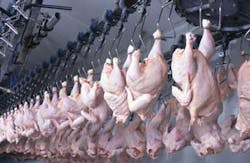US meat and poultry producers join forces to reduce Listeria outbreaks
U.S. meat and poultry manufacturers and processors have done a lot to increase the safety of their products and to ensure high-quality production reaches end consumers. They are committed to use their knowledge and experience over the coming years to help reduce the number of foodborne illnesses, especially listeriosis, stated Dr. Betsy Booren, chief scientist at the American Meat Institute (AMI) Foundation.
Dr. Booren spoke at a public meeting organized by the U.S. Department of Agriculture's Food Safety and Inspection Service and the U.S. Food and Drug Administration to discuss a jointly released report called "Interagency Risk Assessment of Listeria monocytogenes in Retail Delicatessens."
Improvement has been made thanks to extensive research in the industry and because of the fact that successful strategies and best practices have been shared and enhanced. This cooperation has resulted in better prevention and control of listeriosis — a disease that can be very dangerous for some people, especially pregnant women. Still, the disease is comparatively rare. According to data from the Centers for Disease Control and Prevention, no instances of listeriosis outbreaks linked to meat and poultry products have been reported since 2003 and the general incidence of listeriosis from sources other than meat and poultry has dropped dramatically since 2000. These achievements were described by Dr. Booren as a triumph for the industry and she noted that the success was largely due to the non-competitive approach to food safety. However, there is more work to be done before the disease is eliminated. On average about 1,500 people are affected with listeriosis per year. Of those, nearly all will be hospitalized and about 250 patients will die.
RELATED: Researchers develop method to eliminate bacteria in food products
The AMI stated that the organization has been committed to improving food safety since 2001, when its board of directors decided to adopt a non-competitive approach to deal with the challenges of foodborne illnesses by sharing best practices and supporting other members of the institute. Over the past 14 years the AMI has funded a total of 42 research programs at a cost of almost $2.9 million, with a focus on finding ways to reduce and eventually eliminate Listeria monocytogenes in ready-to-eat meat and poultry products.
In addition, since 2000 the institute has run more than 25 workshops on improving Listeria control and prevention, with over 1,600 attendees. The AMI Foundation has also issued detailed equipment and facility design principles that aim to optimize the sanitary aspects of both facilities and equipment, as sanitation is the most critical element of Listeria control.
The AMI hopes that the positive results will be sustained over the coming years, as collaboration is set to continue between the institute, the Food Marketing Institute, its Foundation and its retail members, Dr. Booren stated. Good practices should still be shared at all levels of the supply chain to ensure that the best possible food safety control is being implemented, she concluded.

